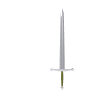|
|
What is Dueling?
A duel may be defined as a pre-meditated, mutually agreeable combat
between two sides of equal numbers, using identical weapons (or at least,
equivalent weapons) and armor (in the case of the earliest duels only -
armor was not worn during later duels) to resolve a dispute concerning
the honour of one of the gentlemen involved.
The duel developed slowly out of the Trial by Combat. At first, it was
legal in that the challenger published cartels asking the ruler (a noble
with the power to administer high justice in that locale (and often the
King)) to grant the combatants a field. In this scenario, the matter would
be settled by single combat, in front of said ruler and other witnesses
(quite often a large crowd). The seconds (men chosen by each combatant
to take their side in the matter, but not to fight alongside them) would
inspect the weapons together, to ensure that neither combatant would be
disadvantaged by the choice of weapons, and to ensure that both were identically
equipped. The duel (including the inspection of the weapons by the seconds)
must take place in the time between sunrise and sunset on the day specified
by the ruler who granted the field. If the duel were to end inconclusively,
the challenged party would be declared the winner; the burden of proof
in a duel always lies with the challenger.
Duels were increasingly fought over inconsequential matters, as young
nobles tried to prove that they still had the right to duel, to settle
quarrels privately, without the permission of the King. And, unofficially,
the practice was encouraged, and the nobles' right to private justice was
maintained, for although the practice was forbidden, a blind eye was turned
to it.
The above information was provided by http://www.crater.com/avacal/jpaper1.html.
|
|
|

The Rules

-
All duels must be voluntary between both parties.
-
Duels may only take place on premises.
-
Duels must be overseen by a duel personality.
-
Defenders have choice of dueling instruments.
-
All choices of dueling instruments are permanent.
-
All duels must be pre-paid. No exceptions will be made, not even
for planned non-fatal practices. Accidents do happen.
-
No duel to the death will be approved without counselling regarding the
metabolically challenged by a resident mortis grandis counsellor.
|
|
|

Arranging a duel:

-
All parties must complete form 623(D)(1), "License to engage in activity
leading to satisfaction of honor," and file it and the $32.50 fee with
the appropriate state authorities.
-
All parties must complete form 623(D)(2), "Notice of incipient flame-war
resolution," and file it with the Duels-R-Us Usenet representative.
-
All parties must find, privately, a mutually acceptable time during which
the duel might take place.
-
All parties must make their own travel arrangements. Air Mayhem is
the airline of choice for Duels-R-Us.
-
All parties must remain on the premises for the time immediately preceding
and following their satisfaction activity.
-
There will be no pillow fights, food fights, towel-snapping, or snowball
throwing unless these are designated dueling/satisfaction activities.
-
All parties must purchase the Medical Insurance Damage and Collision fee
for each day of satisfaction activities.
-
Each dueling party will be assigned a Duels-R-Us "Duel Personality" who
will be responsible for ensuring satisfactory satisfaction activities.
|
|
|

Cost of duel:

Costs of duels range from $10 (self-provided transportation,
no lodging, 2x4
instruments) to $3.45 billion (2 F-4 fighters, full weapons
package,
transportation, lodging, complementary massage and champagne),
excluding tax,
tip, and cost of Medical Insurance Damage and Collision fee.
Special requests
(not involving nuclear materials) are always honored. |
|
|



